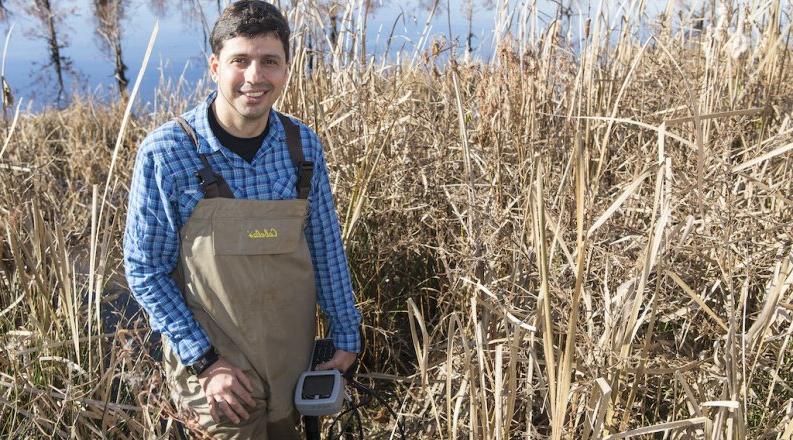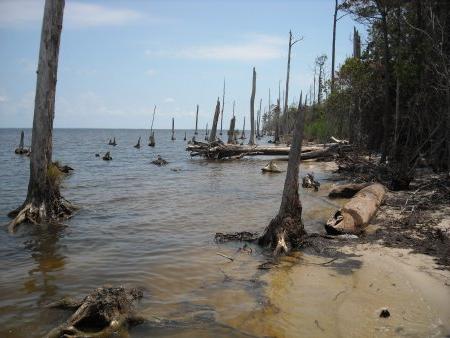维多利亚·伯恩
All along the Atlantic Coast, eerie stands of dead trees dot wetlands and upland forests where hardwoods and evergreens once thrived. The skeleton-like sentinels of these “ghost forests” as they are known are no spooky Halloween tale; they’re a real-life consequence of a changing climate.
“Forested wetlands and upland forests are changing into marshes due to increased saltwater intrusion and more frequent flooding,” said Marcelo 墩Sayao, a professor of forestry and environmental resources at North Carolina 状态 University, in an “Ask an Expert” interview for the school’s College of Natural 资源 最靠谱的网赌软件 in October 2022.
墩Sayao, whose work focuses on environmental sciences, 生态系统, 湿地及溪流, is the featured speaker for the fourth installment of the 保罗·W. 柯克小. Wetlands Lecture series on Sept. 28. 讲座在晚上7点开始.m. in the Big Blue Room at Chartway Arena, 4320 Hampton Blvd. It is free to the public, but seating is limited so RSVPs through ODU’s Office of 社区 Engagement a你鼓励.
According to 墩Sayao, whose research has included the Albemarle-Pamlico Peninsula of North Carolina, 海平面上升, increasing saltwater intrusion, and stronger storms – in particular hurricanes that follow periods of drought – have contributed to the emergence and spread of ghost forests as the trees are starved of the freshwater they need to survive.
And while expanding ghost forests are an indicator of our changing climate, the evolution of these once verdant 生态系统 into marshlands is also evidence of nature’s resilience, “and that we can change our actions to avoid the worst impacts of climate change,” he said in “Ask the Expert.” His talk will cover how ghost forests are created, what they represent in the context of climate change and how research can help inform future restoration and mitigation strategies.
墩Sayao is an associate professor in the Department of Forestry and Environmental 资源 at N.C. 状态. A native of 成本a Rica, he moved to the U.S. to attend Gettysburg College in Pennsylvania, where he earned degrees in biology and environmental science. 他获得了博士学位.D. in ecology from the University of Georgia and completed a postdoctoral position at Duke University. 他加入了N.C. 2016年各州.
ODU’s wetlands lecture series, hosted by the 理学院, is presented in honor of former biology Professor Emeritus 保罗·W. 柯克小., Ph.D., 他于2013年去世. Kirk joined ODU’s faculty in 1971 and served as the associate dean for the 理学院 and 健康 Professions and the graduate program director of biology. His research on hydrocarbon utilization by marine fungi informed the current understanding of marine 生态系统 and biological remediation of oil spills, and he edited the first comprehensive study of the Great Dismal Swamp. He retired from ODU in 1992.
柯克的儿子, Dr. 艾伦·柯克 ’83 and his wife, Robin, created the fund that supports this lecture series in honor of his father. 自2016年以来, the fund has also supported undergraduate and graduate student research in biology and oceanography through the 保罗·W. 柯克小. Wetlands Biology 研究 Award.
Previous lecture topics have included: “Wetlands and Climate Change” (2019, Ariana Sutton-Grier); “Living on the Edge: Chronicles of a Wetland Scientist” (2017, Chris Craft) and “Coastal Wetlands and Sea Level Rise: What Have We Learned” (2015, Irv Mendelssohn and Karen McKee).




